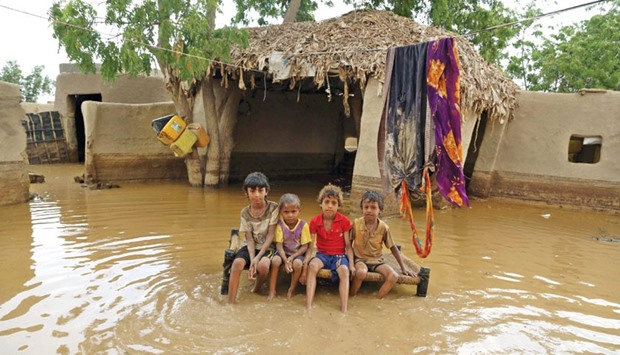
Children sit on a bed in a flooded house following heavy rain in a village in Yemen’s Red Sea province of Houdieda on Friday.
The UN envoy for Yemen declared on Friday that “we have never been so close to peace,” cautiously talking up prospects for talks in Kuwait this week despite violations of a truce.
“The path to peace might be difficult, but it is workable,” Ismail Ould Cheikh Ahmed told the Security Council, cautioning however that violations of the UN-brokered ceasefire “threaten the success of the peace talks.”
The Saudi-backed government in Yemen will begin tomorrow a new round of talks with the Shia Houthi rebels and their allies in Kuwait to end a war that has brought the country to its knees.
The envoy, who was due to fly to Kuwait after the council meeting, welcomed a decrease in violence since the ceasefire went into force yesterday.
Cheikh Ahmed said however there were worrying violations of the truce in Marib to the east, Jawf in the north, and Taiz in the southwest.
“Yemen is facing a brutal war on one hand and a significant terrorist threat on the other” that has grown in the vacuum created by the chaos, said the envoy.
Forces loyal to President Abd-Rabbu Mansour Hadi have launched operations against militants in recent weeks, backed by the firepower of an Arab coalition.
On Friday, pro-government forces expelled Al Qaeda fighters from the provincial capital of Huta, close to Yemen’s second city of Aden.
The UN has raised alarm over the growing influence of Al Qaeda in Yemen and the mounting civilian toll from the coalition air strikes as it pushed all sides to come to the negotiating table.
More than 6,400 people have been killed since an air campaign began in March last year to push back the rebels, who still retain control of the capital Sanaa.
Some 2.8mn people have been driven from their homes, and more than 80% of the population is in need of emergency aid.
“Peace is not an abstract for the people of Yemen, it is vital to their survival,” UN aid official Kyung-wha Kang told the council.
Among the issues to be tackled at the Kuwait talks are agreements on security arrangements, the withdrawal of militias and armed groups, the handover of heavy weapons and the release of detainees.
The conflict in the impoverished nation has raised Middle East tensions.
A previous round of UN-brokered talks in Switzerland in January failed to make any headway. A ceasefire that went into force in December was repeatedly violated and eventually abandoned by the coalition on January 2.
